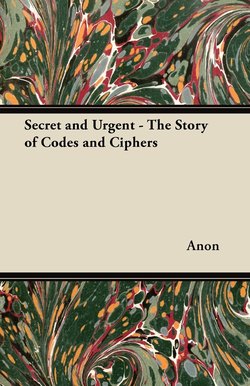Читать книгу Secret and Urgent - The Story of Codes and Ciphers - Анон - Страница 12
На сайте Литреса книга снята с продажи.
II
ОглавлениеSuetonius, the Walter Winchell of ancient Rome, says that Julius Caesar kept his fingers on the political pulse of the home city by writing to his friends from Gaul in a cipher that was prepared by shifting each letter of the original clear four places down the alphabet. Habes opinionis meae testimonium, which he wrote to Cicero, would thus come out as MDEHV RSNQNRQNV PHDH XHVXNPRQNZP, allowing for the fact that the Roman alphabet lacked J, K, W and Y.
Given that the science of solving ciphers had not yet been invented this simple system was enough to protect his correspondence from unauthorized eyes. However, we have the best of reasons for believing that Julius Caesar’s ciphers were neither used very long nor for the conveyance of very important information. Cicero was one of the people in the secret; and Cicero changed political sides, which meant that the great conqueror’s secret was a secret no longer. Moreover, a good many of Caesar’s letters in clear have been preserved. We know from them and from other sources that his usual method of secrecy was to say nothing in writing, but to appoint someone he trusted to carry a message orally.
The only thing he really contributed to the history of secret writing was the use of his name. A cipher composed by displacing the letters of the alphabet two, three or more steps down the line is still known as a “Julius Caesar cipher” in spite of the fact that there is good evidence this type of communication was in use before he was born.
